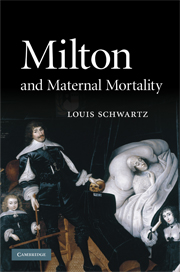Book contents
- Frontmatter
- Contents
- Acknowledgments
- Abbreviations
- Introduction
- PART I BEHIND THE VEIL: CHILDBIRTH AND THE NATURE OF OBSTETRIC ANXIETY IN EARLY MODERN ENGLAND
- PART II “SCARCE-WELL-LIGHTED FLAME”: THE REPRESENTATION OF MATERNAL MORTALITY IN MILTON'S EARLY POETRY
- 4 “Too much conceaving”: Milton's “On Shakespear”
- 5 “Tears of perfect moan”: Milton and the Marchioness of Winchester
- 6 “Farr above in spangled sheen”: A Mask and its Epilogue
- PART III “CONSCIOUS TERROURS”: THE PROBLEM OF MATERNAL MORTALITY IN MILTON'S LATER POETRY
- Index
- References
4 - “Too much conceaving”: Milton's “On Shakespear”
Published online by Cambridge University Press: 04 December 2009
- Frontmatter
- Contents
- Acknowledgments
- Abbreviations
- Introduction
- PART I BEHIND THE VEIL: CHILDBIRTH AND THE NATURE OF OBSTETRIC ANXIETY IN EARLY MODERN ENGLAND
- PART II “SCARCE-WELL-LIGHTED FLAME”: THE REPRESENTATION OF MATERNAL MORTALITY IN MILTON'S EARLY POETRY
- 4 “Too much conceaving”: Milton's “On Shakespear”
- 5 “Tears of perfect moan”: Milton and the Marchioness of Winchester
- 6 “Farr above in spangled sheen”: A Mask and its Epilogue
- PART III “CONSCIOUS TERROURS”: THE PROBLEM OF MATERNAL MORTALITY IN MILTON'S LATER POETRY
- Index
- References
Summary
It has been noted, but little discussed, that when Milton sat down in 1630 to write what would become his first publication (a sixteen-line epitaph for Shakespeare in heroic couplets that appeared in the 1632 Shakespeare Folio), he chose to end his poem with a figure that not only described poetic inspiration as a reproductive process, but as a dangerous one. The figure, as we shall see, suggests that the inspiring power of Shakespeare's verse is so great that it not only impregnates the imaginations of his readers, but also causes the deaths of their imaginations, making them give birth – in the Platonic sense – to so many progeny, to so many fancies, that “fancy” itself ultimately dies in the process. The epitaph was only the sixth poem Milton had attempted in English since he had begun writing vernacular poetry about five years earlier, and was only the fifth that he had completed. The others were “On the Death of a Fair Infant Dying of a Cough,” written some time in 1628, Sonnet I, “Song: On May Morning,” “On the Morning of Christ's Nativity,” and “The Passion”. As many critics have noted over the years, all of these poems, as well as a fair number of the Latin poems Milton had also written by this time, are full of self-conscious expressions of worry over just what sort of poetic identity it would be best for the young poet to establish.
- Type
- Chapter
- Information
- Milton and Maternal Mortality , pp. 79 - 90Publisher: Cambridge University PressPrint publication year: 2009



